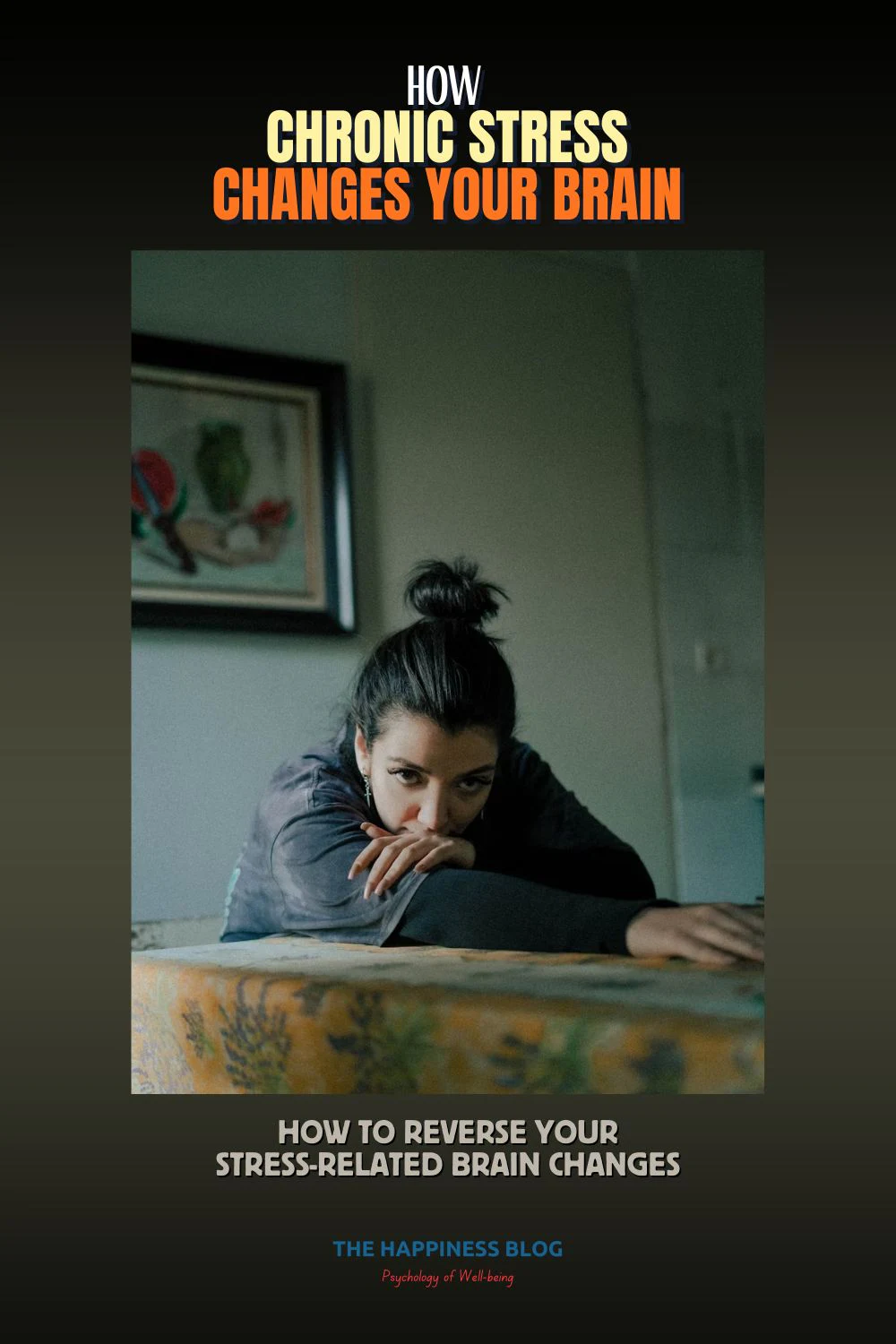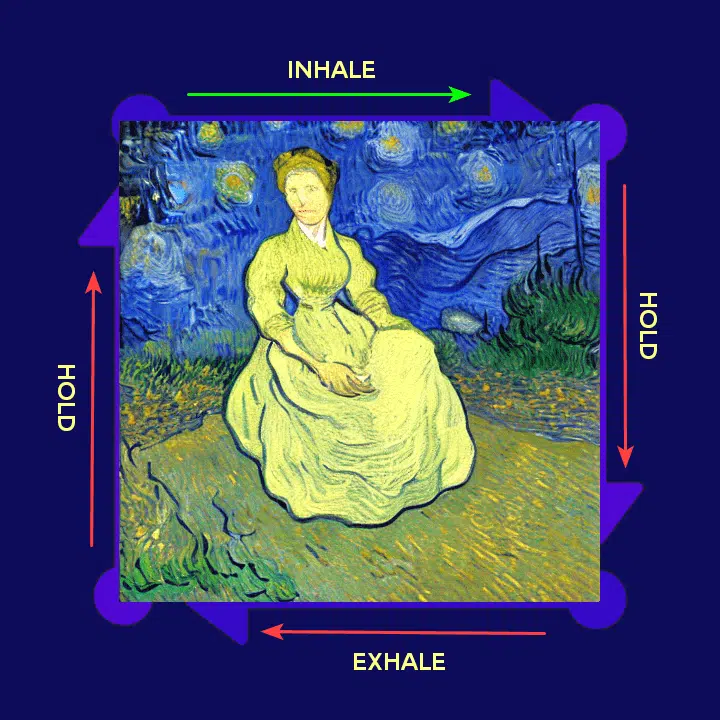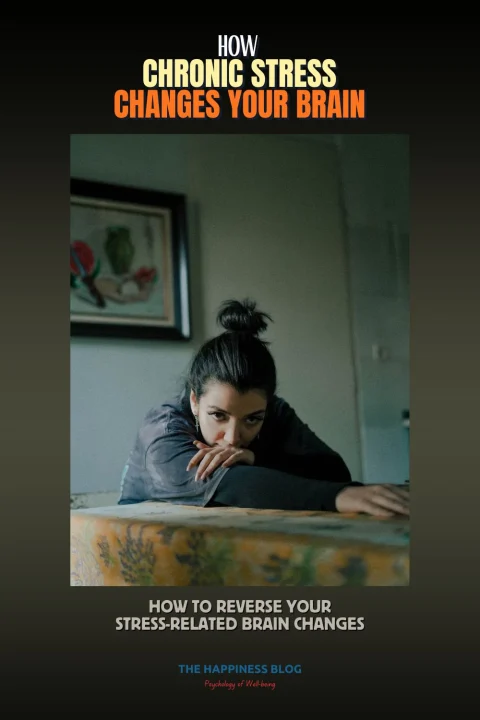Today's Saturday • 8 mins read
Chronic stress can physically alter your brain, not just cause overloaded thoughts and overwhelming emotions.
Discover what decades of research have shown: sustained stress can alter key brain regions responsible for memory, emotion, and decision-making.
Also, learn how to reverse those changes and restore your optimal brain function.
5 Ways Chronic Stress Changes Your Brain
1. The Amygdala Goes Into Overdrive
The amygdala is your brain’s threat detector, constantly scanning for danger in your surroundings.
When it detects a survival threat (acute stress), it triggers emotional reactions ranging from paralyzing fear to explosive rage.
But chronic stress enlarges this almond-shaped structure and makes it hypersensitive. This primes you to overreact to small things. You might snap at people without meaning to, or feel uneasy all day.
Constant stress has made your amygdala recalibrate its threat threshold. So now it treats routine stressors as emergencies. The pattern remains consistent: you live in constant survival mode.
Research shows stress-related disorders, like anxiety, depression, and PTSD, are linked to hyperactivity or hyperreactivity of the amygdala (Zhang & Yin, 2018). It may be caused by prolonged exposure to cortisol, the body’s main stress hormone.
Chronic stress turns your amygdalar alarm system into a hair trigger, making minor annoyances spark major emotional reactions.

2. The Hippocampus Shrinks
The hippocampus is your brain’s memory hub, responsible for forming new memories and retrieving stored information.
MRI studies reveal that sustained stress impairs the growth of new neurons in the hippocampus, leading to reduced mental sharpness and a lasting brain fog.
You may forget appointments, struggle to absorb new information, or feel mentally sluggish. You feel frustrated that you can’t seem to remember old things or learn new skills as easily as you used to.
The damage isn’t permanent, though, and early intervention can reverse these effects. But prolonged stress makes the changes harder to undo.
Shrinkage of the hippocampus is also linked to depression, since this region helps regulate mood as well as memory. Research suggests that stress-induced changes in the hippocampus may underlie disorders like PTSD and depression (Kim & Pellman, 2015).
Chronic stress shrinks your memory center, the hippocampus, making it harder to learn, recall, and stay mentally clear.
3. The Prefrontal Cortex Weakens
The prefrontal cortex (PFC) is your brain’s executive center. It manages decision-making, impulse control, focus, and emotional regulation.
Long-term stress shrinks nerve-cell branches (dendrites) in this region. This makes it harder for the brain cells here to connect and communicate with each other.
Researchers found chronic exposure to uncontrollable stress can cause loss of spines and dendrites in the prefrontal cortex (PFC), which weakens synaptic connectivity (Woo & Sansing, 2012).
Another study linked chronic stress exposure to marked impairment of brain functions, including working memory (“the ability to keep events in mind”) and executive function (McEwen & Morrison, 2013).
This explains why stress that goes on for long can make you feel scattered, unable to keep your thoughts or emotions in check. You tend to give in to impulsive decisions rather than well-thought-out ones.
Chronic stress weakens your prefrontal cortex, breaking down the circuits that support focus, control, and balance.
4. Brain Networks Get Scrambled
Your brain depends on smooth communication between regions to adapt to challenges, recover, and shift out of negative thought loops.
Chronic stress disrupts these pathways, notably between the prefrontal cortex and the amygdala, leading to fractured connectivity (Zhang et al., 2021).
When the prefrontal cortex cannot control the amygdala properly, the brain’s threat alarm system runs unchecked. Neuroimaging studies show this disruption looks more like tangled wires instead of neatly arranged information lines.
The result is that different brain regions struggle to work together, making it harder to recover from setbacks, break free from rumination, or shift your mindset.
Chronic stress scrambles brain networks, disrupting signals and throwing coordination off track.
5. Your Cortisol Rhythm Flatlines
Cortisol, the body’s primary stress hormone, runs on a daily clock. It peaks in the morning to help you wake up, then gradually falls, so your body can wind down at night.
But chronic stress flattens this natural daily rhythm. So you’re groggy or exhausted when you need energy after waking up and wired when you should be winding down.
When this cycle collapses, your sleep quality also takes a direct hit. You can sleep for eight hours and still wake up unrefreshed.
Studies show that disrupted cortisol rhythms create a feedback loop: poor sleep further upsets the cortisol cycle, which then makes restorative rest even harder (Knezevic & Nenic, 2023).
Over time, this misalignment seeps into every major system of the body.
Cortisol dysrhythmia can weaken your immune defenses, dull memory and concentration, and destabilize your mood. It may also increase the risk of metabolic issues, cardiovascular strain, and long-term decline of brain functions.
Chronic stress flattens your cortisol rhythm, scrambling the body’s internal clock.
Brain Fog: “Brain fog” refers to a collection of symptoms, including persistent confusion, cognitive and attention deficits, and impairment of executive functioning, language, processing speed, and working memory. Simply put, brain fog is a condition that makes it difficult to think critically, recall things, make quick decisions, and find the right words when speaking or writing.
7 Science-Based Ways To Protect Your Brain from Stress-Related Changes
These seven strategies from neuroscience studies help protect key brain areas affected by chronic stress.
Start small. Pick one today, and watch your mental clarity return. The first three are the basics—proper sunshine, sleep, and exercise.
1. Catch Morning Sunlight and Curb Late Caffeine
Soon after waking up, step outside for 10–15 minutes to sync your cortisol peaks with the sunrise. Natural light signals your brain to elevate cortisol at the right time, setting up a healthy decline by evening.
Have your coffee in the morning, but cut it off after early afternoon. That late-day jolt piles on stress hormones when your body should be winding down.
These two simple tweaks will restore your inner clock and natural energy curve, swapping exhaustion for even-keeled days.
2. Prioritize 7-8 Hours of Quality Sleep
You can’t handle stress on less sleep. Regularly sleeping for 6 hours or less can increase your dementia risk by 30% (Sabia & Fayosse, 2021).
A good night’s sleep lets the hippocampus replay the day’s events during deep non-REM sleep, turning short-term experiences into lasting memories. It also boosts synaptic plasticity, which improves learning and prevents the mental fog caused by sleep loss (Prince & Abel, 2013).
Wind down with a sleep hygiene routine. Go to bed and wake up at the same time, even on weekends.
3. Move Your Body with Regular Exercise
A brisk 30-minute walk sparks new cell growth in memory hubs like the hippocampus. It also increases prefrontal blood flow, sharpening decisions amid chaos.
Science backs exercise as a stress-buster that rebuilds and prevents future wear.
4. Practice Mindfulness Meditation Daily
Even five minutes of focused breathing or guided sessions can dial down your brain’s overactive alarm system.
Studies show it shrinks amygdala reactivity, easing anxiety by boosting connections to calmer regions. Over time, this builds emotional steadiness, flipping a switch from frenzy to focus.
5. Try Controlled Breathing Techniques
Controlled breathing has been linked to lower stress and happiness boosts. Try these:
- Double inhale with a long exhale: Take a deep breath, add a quick extra inhale at the end, then exhale slowly. This boosts oxygen, calms the nervous system, and reduces stress; practice for a few minutes daily or as needed (popularized as “physiological sigh” by Dr. Andrew Huberman).
- Controlled (diaphragmatic) breathing: Deep belly breaths calm the body and mind by engaging the diaphragm and stimulating the vagus nerve. Inhale slowly through the nose so your belly rises, then exhale through the mouth so your belly falls. Repeat a few times.
- Box breathing: Inhale for four counts, exhale for four. This activates your body’s relaxation response, cutting amygdala hyperactivity during tense moments.

6. Build Structured Daily Routines
Map out your day with clear steps. It offloads the mental juggling act on your brain’s executive center.
Mind-body practices tied to routines, like yoga, strengthen prefrontal connections, curbing impulsive reactions. Feel the relief as predictability turns stress into steady progress. Read Positive Movement: A New Revolution for Flourishing Lives.
7. Embrace Novelty and Fresh Learning
Switch up your commute or dive into a new hobby; it rewires stalled brain networks.
Dopamine surges from surprises enhance connections, breaking negative loops faster. This playful tweak keeps your mind flexible, turning routine ruts into growth paths.
Final Words
Your brain’s remarkable plasticity means that damage from chronic stress isn’t permanent. But don’t wait for too long.
Start today with consistent practice of these evidence-based strategies to restore your brain to optimal function, reversing the effects of chronic stress on it.
• • •
√ Also Read: How To Stimulate Your Vagus To Lift Your Mood (From Science)
√ Please share this if you found it helpful.
» You deserve happiness! Choosing therapy could be your best decision.
...
• Disclosure: Buying via our links earns us a small commission.
